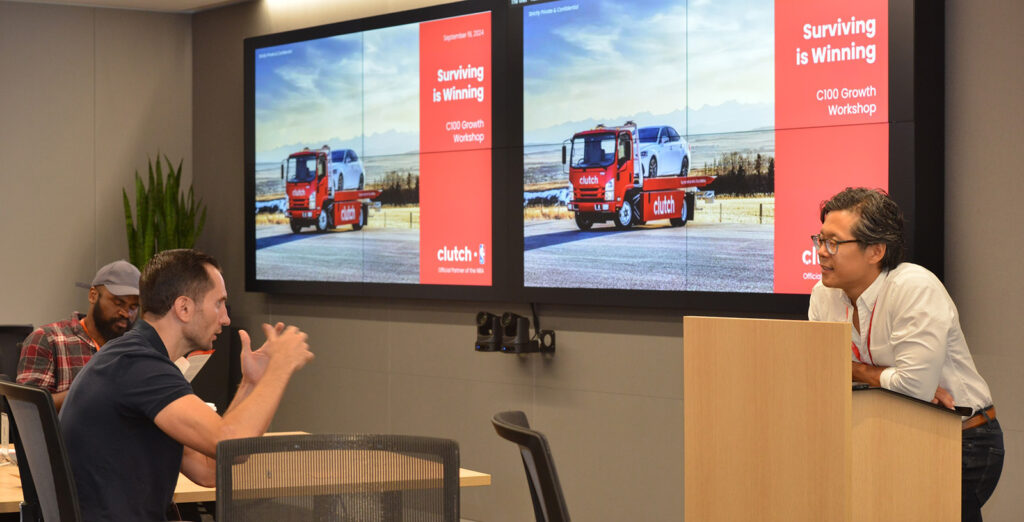Scaling a startup into a successful, high-growth company is a journey filled with challenges, pitfalls, and invaluable lessons. Last month, we invited a group of Canada's most accomplished tech founders and executives—including Mike Wessinger, Allen Lau, Sloan Gaon, Joanna Griffiths, Chris Bryson, Dan Park, Rebecca Kacaba, and Rohan Mahimker—to share their insights at a workshop for the new C100 Growth Program companies in Toronto.
Here are the key takeaways for founders and executives navigating the scaling process.
Hire for What You Need, Not What Looks Good on Paper
One of the most common mistakes growing companies make is hiring the wrong executives. Founders often focus on impressive resumes with big-name brands without delving into what candidates accomplished in their previous roles, and what role they played in driving that company’s success. Rohan Mahimker highlighted how his team initially fell into this trap, hiring based on pedigree rather than fit. The lesson? Scrutinize not just the company’s achievements but also how a candidate's specific competencies and role in driving those achievements align with your company's current objectives and stage of growth.
Evolve as a Leader
Scaling a company requires founders to evolve alongside their business. Chris Bryson detailed this progression:
- Startup Phase: The founder is the driving force, deeply involved in every facet of the business.
- Growth Phase: The "awkward teenage years" where the founder begins to delegate, albeit reluctantly, and introduces processes.
- Scale-Up Phase: The founder becomes an evangelist and coach, empowering teams and distributing ownership among functional leaders.
Sloan Gaon echoed this sentiment, emphasizing that leaders must transition from working in the business to working on the business. This shift allows CEOs to focus on big-picture strategies like sales, profitability, and market expansion.
Maintain a High-Performance Culture
As companies expand, preserving the original high-performance culture becomes challenging. Mike Wessinger shared how his company lost its cultural essence amidst rapid growth and financial success. The realization prompted a deliberate effort to reorient the company back to its foundational values. Rebecca Kacaba discussed strategies she employed at Dealmaker to maintain a strong culture, stressing that culture and leadership are like products needing constant updates.
Joanna Griffiths highlighted the importance of fostering a culture of good listeners. Effective communication ensures that new team members assimilate seamlessly, keeping the company's ethos intact.
The Power of Communication and Transparency
Transparent communication is vital for aligning teams and driving success. Sloan Gaon emphasized that when everyone knows exactly what they should be doing, the organization operates more efficiently. Open dialogues help in setting clear goals and expectations, which is crucial during periods of rapid growth.
Learn from Others to Avoid Common Pitfalls
A recurring theme among the speakers was the value of learning from others' challenges to avoid costly missteps. In the current business environment, founders have the advantage of hindsight from previous growth cycles. By absorbing these lessons, they can approach scaling with a "position of sobriety," instead of the frenzy of past hype cycles.
Dan Park illustrated this by sharing how he navigated his company through difficult periods by focusing on survival and stripping away non-essential activities. By turning off certain marketing programs, he could identify what truly contributed to the business, allowing for more strategic resource allocation.
Focus on Product-Market Fit and Agility
Allen Lau discussed the challenges his company faced in finding product-market fit and effective monetization strategies. The key was persistent iteration and refinement. Once they identified what worked, they doubled down on those strategies. This agile approach ensures that the company remains responsive to market needs and positions itself for sustainable growth.
Conclusion
Scaling a company is not just about increasing numbers; it's about evolving leadership, maintaining culture, and strategic hiring. Founders must be willing to adapt their roles, foster transparent communication, and learn from the experiences of others. Culture and leadership require continuous effort to stay relevant and effective.
By internalizing these lessons from Canada's tech titans, startup and scale-up founders can more effectively navigate the complexities of growth, avoid common pitfalls, and steer their companies toward long-term success.


